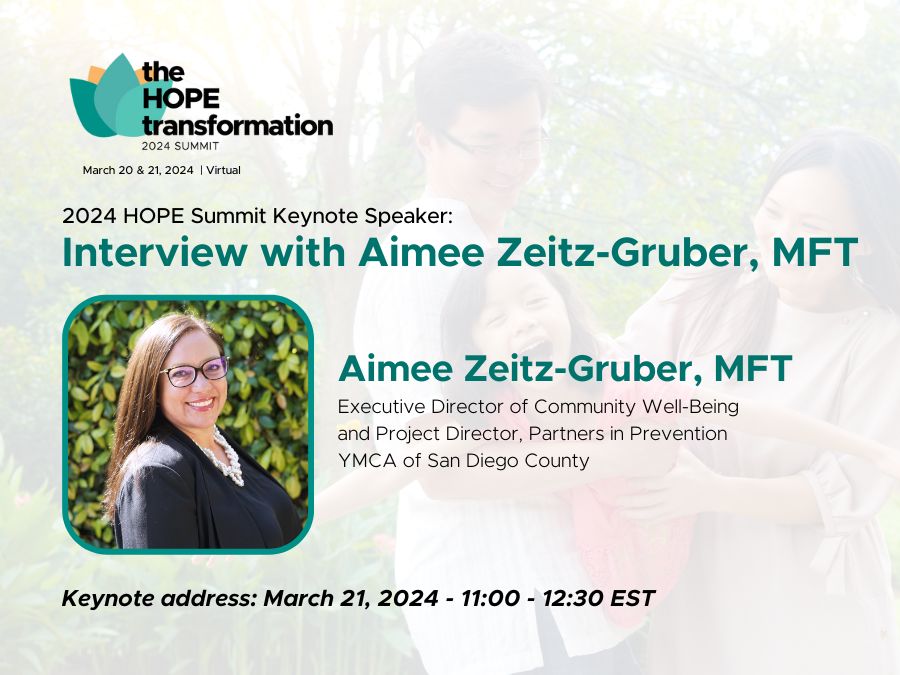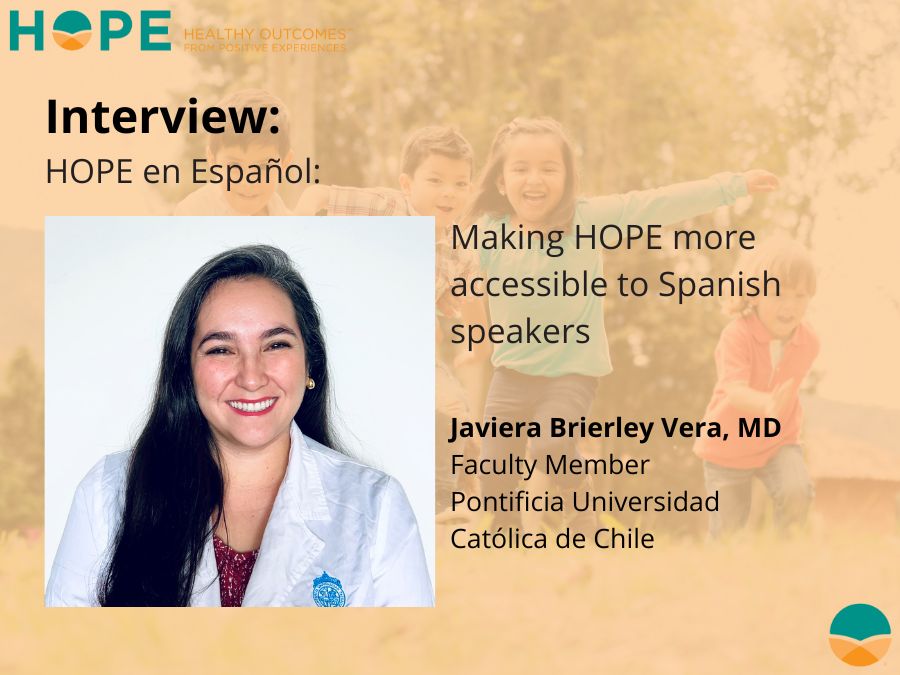
The HOPE National Resource Center welcomes Aimee Zeitz-Gruber, MFT as our keynote speaker at the Fourth Annual HOPE Summit – The HOPE Transformation. She will present HOPE in Action on Thursday, March 21 from 11:00 AM – 12:00 PM ET. Aimee Zeitz-Gruber is the Executive Director of Community Well-Being and Project Director of Partners in Prevention at the YMCA of San Diego County, where she has worked with the HOPE National Resource Center since 2020 to implement the HOPE framework in her organization. During her keynote address, she will discuss how the framework has made a difference in her work. She will share the importance of incorporating positive childhood experiences (PCEs) into multiple areas of the YMCA organization. We recently interviewed with Zeitz-Gruber to learn more.
Fostering a greater sense of belonging and mattering within the organization and partners
The changes [through the HOPE framework] can be seen in more connected and compassionate interactions between staff, supervisors, and program participants…We have heard staff describe feeling more connected, honored, seen, and valued and that it has changed how they show up to do their work.” -Aimee Zeitz-Gruber
HOPE – Healthy Outcomes from Positive Experiences is a flexible framework centered around the practice of positive childhood experiences (PCEs) that can be applied to many sectors and communities. What does HOPE look like to you and the community at the YMCA of San Diego County?
The HOPE framework has been embraced by multiple sectors in San Diego County, including health, social services, child welfare, and education providers. HOPE has resonated with so many people because it naturally aligns with efforts grounded in social determinants of health, protective factors, and strengths-based approaches. So many providers and practitioners can see themselves, their values, and their work in the Four Building Blocks of HOPE. HOPE in practice looks like deeply relational interactions, between peers, partners, supervisors, and program participants. It looks like always starting with where things are going well and then exploring opportunities to address where things are hard or needing more supports or resources. It is a different conversation from Adverse Child Experiences (ACEs), from being largely determinant, to being another source of information for establishing with families what they want and need. HOPE in action across sectors looks like more consistent experiences with providers in doctors’ offices, social service programs, and in communities.
You and your colleagues have implemented the HOPE framework throughout all levels at the YMCA including service delivery, staff engagement, and community partnerships. What changes have you seen since aligning your work with HOPE and PCEs?
The YMCA of San Diego County has been working on moving towards a more comprehensive, strengths-based service delivery approach for a few years now. We started by grounding our work in anti-racist, trauma-informed, and Strengthening Families frameworks and most recently integrated the HOPE framework. For many of our teams, HOPE brought these various frameworks together in a way that felt more integrated and actionable. The changes can be seen in more connected and compassionate interactions between staff, supervisors, and program participants. We have seen that when leaders are held and supported through a HOPE lens, they show up for their teams with a HOPE perspective and then staff engage with partners and program participants in ways that are aligned with HOPE’s values and standards. We have heard staff describe feeling more connected, honored, seen, and valued and that it has changed how they show up to do their work. We have also seen concrete changes in terms of updates to policies and practices like forms, documents, workflows, and more. HOPE has fostered a greater sense of mattering and belonging within our organization and with partners.
Start where you are; take an inventory of how you are already aligned and putting the HOPE framework into practice across your organization (even if you have not been focused on HOPE intentionally).
What makes a HOPE implementation successful at an organizational level? What advice would you give to someone interested in practicing HOPE and PCEs in their work or community?
Start where you are; take an inventory of how you are already aligned and putting the HOPE framework into practice across your organization (even if you have not been focused on HOPE intentionally). Consider this from different vantage points – staffing positions, programs, and departments. Then, get clear on where you want to be including what you want HOPE to look like in your organization and why. Partner with “early adopters”, existing champions of HOPE and PCEs, to create a plan for where and how to get started. We found that orienting the organization to the HOPE framework through trainings was a great start, and then working with leadership and individual teams to explore opportunities to boost HOPE-inspired practices and policies.
We look forward to hearing your keynote address, “HOPE in Action,” at the Fourth Annual HOPE Summit. What are the key takeaways attendees can expect from your presentation?
Attendees will learn about the YMCA of San Diego County’s HOPE adoption process, including successes and lessons learned. The presentation will highlight how we embraced the framework, within our organization and with partners. The session will also describe how we have integrated the HOPE framework into local and state-level systems change efforts, and the impact the framework has had on staff, partners, and community members. The presentation will also describe the challenges we have experienced, how we addressed them, and our plans for deepening our adoption and integration activities. I hope that attendees come away from the sessions feeling inspired to take the HOPE framework to the next level in their organizations and communities, with some concrete ideas for how to do that.
Join us at the 2024 HOPE Summit
The Fourth Annual HOPE Summit will take place virtually on March 20 and 21, 2024. The Summit is for all who want to learn more about how positive childhood experiences (PCEs) and the HOPE framework support children’s growth into healthy adults. This year’s goal and theme – The HOPE Transformation – is to support organizational transformation and the adoption of the HOPE framework. Summit participants will learn about the Six Standards of HOPE and the new HOPE-Informed Organizational Certification program.
The Summit features two keynote addresses, a panel discussion, three sessions of workshops, networking opportunities, and more. Workshops and presentations are led by leaders in their field who are using HOPE in their own work. You will leave the event with concrete examples of how to begin practicing HOPE in your own work with children and their families.


